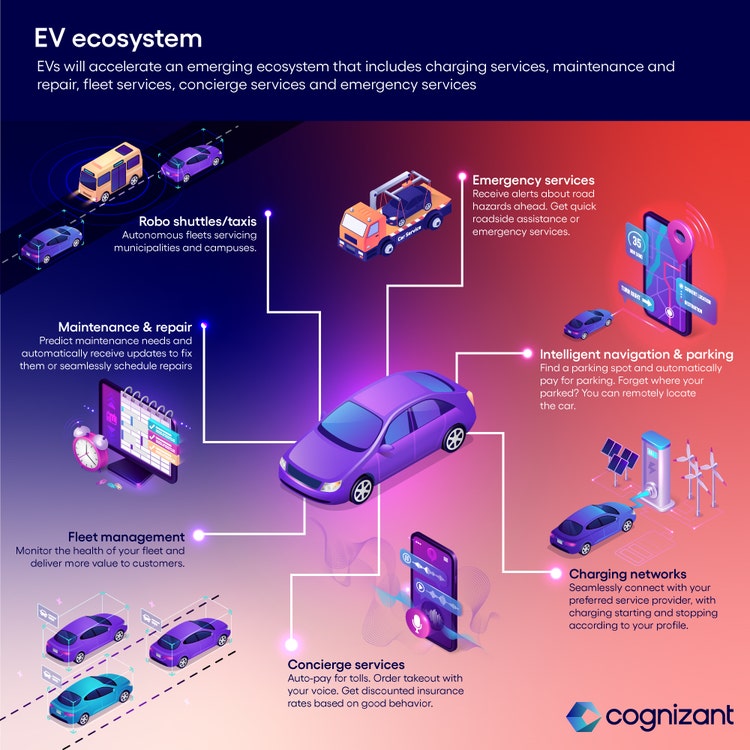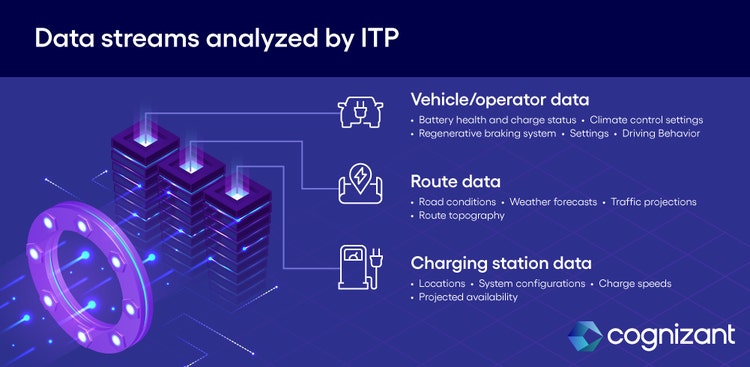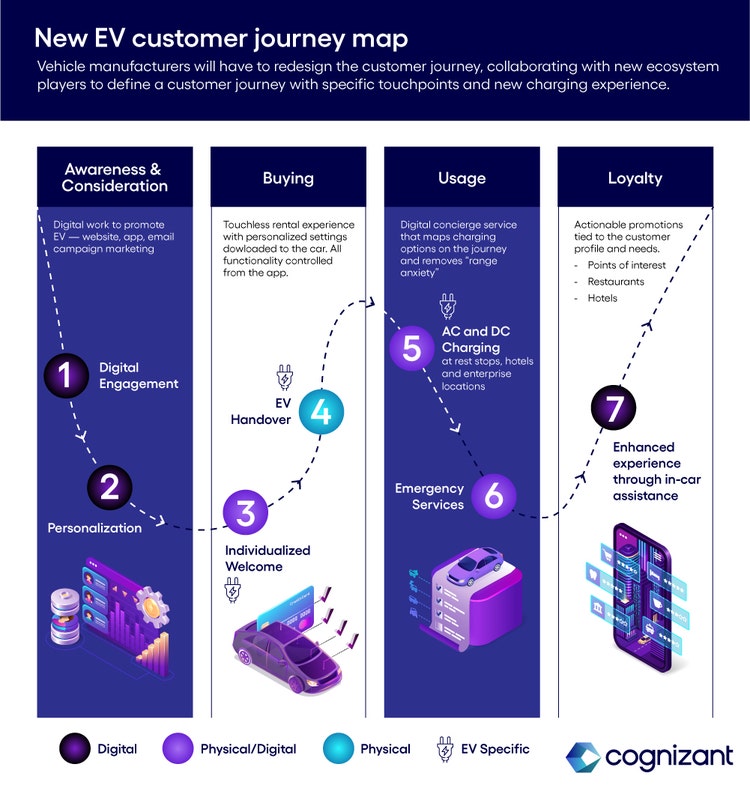
Get past EV ‘range anxiety’ with intelligent trip planning styles-text-white
data-xy-axis-lg:null; data-xy-axis-md:null; data-xy-axis-sm:80% 0%
<p><br> February 10, 2023</p>
Get past EV ‘range anxiety’ with intelligent trip planning
<p><b>Consumers are delaying EV purchases for fear of being inconvenienced (or worse) by a dead battery. Here are pragmatic steps carmakers should take to eliminate this worry and expand the market.</b></p>
<p>Today, owners of electric vehicles (EVs) are early adopters in the truest sense. They’re prepared to plan their routes carefully, manage battery resources diligently, and choose strategic rest stops to recharge those batteries. They are enthusiastic pioneers in the nascent EV ecosystem future.</p> <p>But to cross the chasm from these early adopters to the mass market, EV manufacturers must appeal to a different kind of consumer—one who is less independent more cautious, and just wants the damn car to get them where they’re going without fear of being stranded, juiceless.</p> <p>In fact, <a href="https://www.autolist.com/news-and-analysis/2022-survey-electric-vehicles" target="_blank">44% of EV shoppers recently surveyed by Autolist</a> said range anxiety was their reason for delaying their purchase. And 36% cited concerns about access to charging stations, which amounts to the same thing. Most consumers tend to resist change, and getting into an EV feels like stepping into the unknown. With fossil fuel-powered cars, we’re confident we’ll find a gas station when we need one. But with EVs, timely access to a battery charging station is far less certain—unless you’re one of those early adopters, willing to put in the effort to make sure you never venture out of range.</p> <p>Notably, range anxiety is not a purely logic-driven fear. Far from it, in fact. Most drivers put no more than 50 miles on the odometer on any given day. That’s a fraction of the range of a fully charged EV, so range anxiety only comes into play when buyers think about longer trips.</p> <p>So for many, rare long-trip scenarios become a defining factor in the decision to purchase (or even rent) an EV. This use case that can be addressed by an enhanced EV ecosystem, as shown in Figure 1, and intelligent trip planning (ITP). At Cognizant, we envision an ITP system that would use artificial intelligence (AI) tech and driver-supplied data to plot a route, optimize battery use, and schedule recharging stops. By creating ITPs, manufacturers would reduce or eliminate the range anxiety that has been holding back the EV market, benefitting consumers and carmakers alike.</p>

#
<p><span class="small">Figure 1</span></p> <h4>Are we there yet?<br> </h4> <p>To achieve an excellent ITP system, GPS-based route mapping is the natural starting point. Apple’s EV Routing add-in for Maps and the Chargemap app for Android Auto are both steps in the right direction, but a fully realized ITP app will do much more.</p> <p>An ITP system begins with the operator providing a destination and a target arrival time. This will typically be done with an in-car app, but any connected device could be used.</p> <p>The ITP would then combine and analyze multiple streams of stored and real-time data that impact battery life and range calculations from vehicle systems and multiple sources, as shown in Figure 2.</p>

#
<p><span class="small">Figure 2</span></p> <p>As noted, the ITP learning and AI-powered processing technology will then use this data to plot the route, optimize battery utilization, and schedule the right rest-and-recharge stops for an anxiety-free trip. Moreover, as the hospitality industry expands its value-added services portfolio with on-site EV charging, next-generation ITPs will be able to make restaurant and room reservations along the way. Figure 3 also shows the opportunity players have to re-imagine an EV customer journey with multiple points of intersection to provide an enhanced experience.</p>

#
<p><span class="small">Figure 3</span></p> <h4>On the road: Continuous real-time replanning<br> </h4> <p>Once drivers are behind the wheel, their ITP will go into continuous planning mode, receiving and processing real-time input from the same systems used to generate the pre-departure plan and notifying the operator of recommended changes.</p> <p>Operators will get instant alerts when any change in the inputs (such as driving behavior, charging station availability and unplanned route decisions) necessitates an adjustment to the enroute charging itinerary, impacts destination arrival time, or both.</p> <h4>Under the hood, in the cloud, on the ground: Enhancing the EV ecosystem<br> </h4> <p>If done right, ITP could trigger a profound paradigm shift as consumers become more comfortable with the idea of EVs. As the world transitions from fossil fuel to electric vehicles, consumers will leave behind the notion of a car guided by a driver and instead climb into a connected, software-defined vehicle able to meet their needs with maximum efficiency.</p> <p>Under the hood, the collection of disparate vehicle systems must evolve toward a unified, remotely managed software platform. That platform must be permanently connected to an EV cloud that integrates data from any system that can contribute to better EV performance. The EV cloud itself must be permanently connected to a smart EV charging infrastructure that signals its status continuously. And the processes, distributed across local and cloud resources, must take advantage of more powerful analytics, and new machine learning and AI capabilities.</p> <p>EVs have been building sales momentum and gaining market share for several years. But if manufacturers are to persuade the big part of the consumer bell curve to give up their familiar fossil fuels for EVs, they’ll have to help those consumers overcome range anxiety. ITP systems should play a major role in this effort.</p> <p><i>To learn more, visit the </i><a href="https://www.cognizant.com/us/en/services/iot-solutions/mobility-plus" target="_blank" rel="noopener noreferrer"><i>Cognizant Mobility+</i></a><i> section of our website or </i><a href="https://www.cognizant.com/us/en/services/iot-solutions/mobility-plus#contact-us" target="_blank" rel="noopener noreferrer"><i>contact us</i></a><i>.</i></p> <p><i>This article was written by Tim Meyer, Director – EV & Fleet Electrification/Smart Connected Mobility in Cognizant IoT's Solution Practice and Dr. Shivanajay Marwaha, Techno-Business Advisory Leader in Cognizant's IoT Solution Practice.</i></p>
<p>We’re here to offer you practical and unique solutions to today’s most pressing technology challenges. Across industries and markets, get inspired today for success tomorrow.</p>
